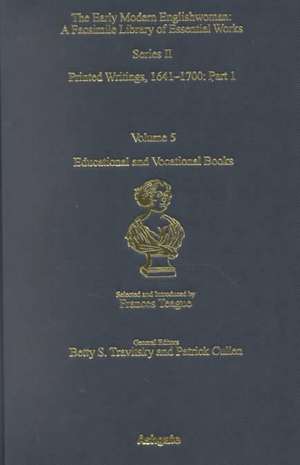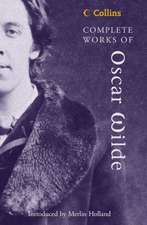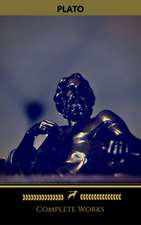Educational and Vocational Books: Printed Writings 1641–1700: Series II, Part One, Volume 5: The Early Modern Englishwoman: A Facsimile Library of Essential Works & Printed Writings, 1641-1700: Series II, Part One
Autor Frances Teagueen Limba Engleză Hardback – 27 iun 2001
Preț: 496.53 lei
Preț vechi: 665.37 lei
-25% Nou
Puncte Express: 745
Preț estimativ în valută:
95.01€ • 99.45$ • 79.08£
95.01€ • 99.45$ • 79.08£
Carte tipărită la comandă
Livrare economică 01-15 aprilie
Preluare comenzi: 021 569.72.76
Specificații
ISBN-13: 9780754602132
ISBN-10: 0754602133
Pagini: 192
Dimensiuni: 156 x 234 mm
Greutate: 0.43 kg
Ediția:1
Editura: Taylor & Francis
Colecția Routledge
Seria The Early Modern Englishwoman: A Facsimile Library of Essential Works & Printed Writings, 1641-1700: Series II, Part One
Locul publicării:Oxford, United Kingdom
ISBN-10: 0754602133
Pagini: 192
Dimensiuni: 156 x 234 mm
Greutate: 0.43 kg
Ediția:1
Editura: Taylor & Francis
Colecția Routledge
Seria The Early Modern Englishwoman: A Facsimile Library of Essential Works & Printed Writings, 1641-1700: Series II, Part One
Locul publicării:Oxford, United Kingdom
Cuprins
Contents: Introductory Note; Anna Maria van Schurman, The Learned Maid; Bathsua Reginald Makin, An Essay to Revive the Antient Education of Gentlewomen; Advice to the Women and Maidens of London; Triumphs of Female Wit in Some Pindarick Odes, or The Emulation.
Descriere
From the beginning of the seventeenth century, English society started to become preoccupied with education and how people acquired it. It is all the more surprising, then, that there should be relatively few early modern texts by Englishwomen devoted to the question of how one should learn. The four texts printed here are principally concerned with language and arithemetic. One of the reasons for the paucity of such writings is that many commentators viewed women's ability to write as a threat to social stability. The education of women was at best ad hoc. A few attended dame schools, and the wealthy could afford private tutors. Among her own family and friends, however, the individual learned girl was often celebrated, and instances of formal praise act as forewords to some of the texts printed in this volume.





















